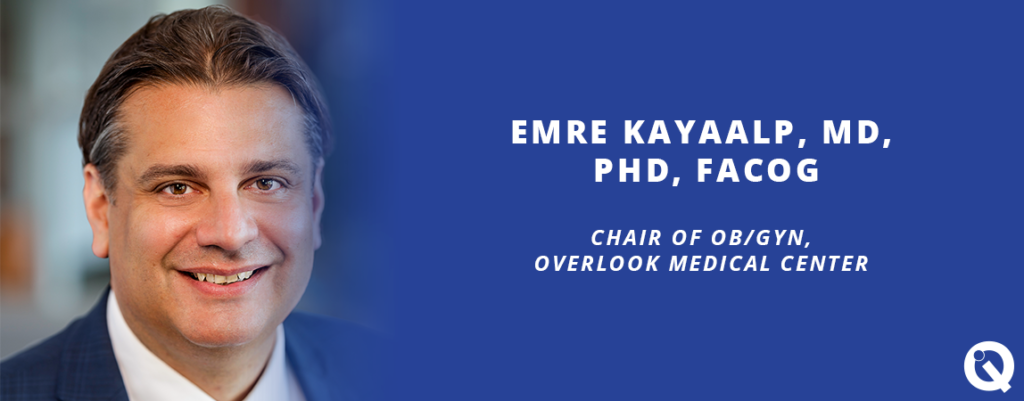Emre Kayaalp, MD, PhD, FACOG, Chair of OB/GYN at Overlook Medical Center. Dr. Kayaalp is a member of the advisory board of the Maternal Infant Health Hub. The Quality Institute, in partnership with the Burke Foundation, created the Hub to develop ways to make midwives a bigger part of the birth experience in New Jersey.
How would changing the way we pay physicians improve quality in maternal care?
When we talk about payment, we’re talking about the behavior you are incentivizing or disincentivizing. So let’s describe what I see as a problem in the private sector, not just in New Jersey, but everywhere. Ob-gyns are paid with these global fees; you’re really penalized if you are not there for the actual delivery. That puts a heavy incentive on the private physician to be present for all of their deliveries. At first glance, that may not sound like a bad thing. But it could be a problem. If you are a solo practitioner — we still have lots of them in New Jersey — or a small group practice — then you’re pretty much on call around the clock. Fatigue can set in.
I think the payment model for private physicians clashes with a laborist model of care. The laborist model is when hospitals employ physicians to provide continuous coverage of labor and delivery units. That’s a model I do believe in because if you look at things from a global health perspective, there’s pretty good evidence worldwide that having a dedicated laborist team is better for patient safety and for consistency of care. We have major disparities in New Jersey. One way to improve quality is to be more consistent in how we approach everyone.
You have worked in other countries. If you could make one change, what would you do to make births safer in the United States?
I thought about this quite a lot. The single biggest factor would be universal health insurance. That’s not going to fully solve the problem, but it would make it much better. Access to care is worse for patients who don’t have health insurance — and lack of access to care contributes to disparities in outcomes.
You have practiced medicine in Canada and worked in Turkey with migrants and refugees. What have you learned in global care delivery that would benefit the United States?
Universal health care access is the big one. And there’s much more use of evidence-based guidelines and practice standards. Here we let individual physicians practice as they want, within some general boundaries.
In other Western markets, you tend to have more standards that are applied, especially in labor and delivery. In most of the world deliveries are mostly done by midwives and family doctors. That is rare here. In other countries, we see less invasive monitoring, especially in early labor. That’s been shown to reduce Cesarean section rates without increasing bad outcomes for the mom or the baby.
In Canadian, British, Australian and New Zealand markets, there’s a tendency to treat pregnancy and labor as a normal physiologic process; whereas we tend to treat it as a disease that needs intensive care treatment. And our approach has not been shown to improve outcomes. It just basically increases morbidity and mortality for the mom without any benefit for the baby. For instance, in most of the world there’s a real emphasis on avoiding induction of labor. You really want labor to start naturally. We’re very aggressive about inducing labor. … So there’s a big philosophical difference in how we approach pregnancy and delivery.
I have to say that if something goes wrong, like you have a placenta accreta, and you’re hemorrhaging, that’s when our system shines. I don’t want to sound like I’m criticizing the American system. We’re really good at intensive care … what we’re not so good at is the normal routine stuff.
What I’m trying to build here at Overlook is a system where you can treat most labor in a low key and minimally invasive way. But if and when something goes wrong, you instantly switch to our intensive care model. You should not have to choose one or the other.
Can you tell us why you joined the Maternal Infant Health Hub Advisory Board?
It was mostly due to Julie Blumenfeld. I reached out to her when I started here at Overlook because I’m trying to build an academic midwifery practice group. And I was looking for people who are leaders in that field. She was very supportive of the model we’re trying to build here and suggested I join the Advisory Board. It looks like something that I could be passionate about and hopefully contribute to.
Finally, we like to add a question outside people’s professional life. Can you tell us your favorite New Jersey artists?
Lauryn Hill and the Fugees. I remember the music of the late ’90s and I am so impressed by her, especially her solo album.

